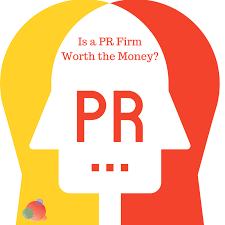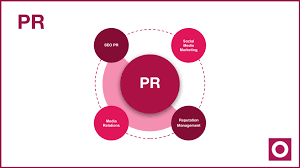Unlocking Success: The Vital Role of PR Firms in Today’s Business Landscape
The Role of PR Firms in Today’s Business Landscape
Public Relations (PR) firms play a crucial role in shaping and maintaining the reputation of businesses in today’s competitive landscape. These firms are tasked with managing communication between an organisation and its stakeholders, including the media, customers, investors, and the general public.
One of the primary functions of PR firms is to help businesses build a positive image and establish strong relationships with their target audience. This involves crafting compelling narratives, managing media relations, and implementing strategic communication campaigns to promote brand awareness and credibility.
PR firms also play a vital role in crisis management. In the event of a negative incident or controversy, PR professionals step in to mitigate damage to the company’s reputation and ensure transparent communication with stakeholders.
Furthermore, PR firms are instrumental in helping businesses navigate the digital landscape. With the rise of social media and online platforms, maintaining a strong online presence is essential for brand visibility. PR firms utilise digital tools and strategies to engage with audiences effectively across various channels.
In addition to traditional PR practices, modern PR firms often offer integrated marketing communications services. By aligning PR efforts with marketing initiatives, these firms can deliver cohesive messaging that resonates with target audiences and drives business growth.
Overall, PR firms serve as valuable partners for businesses looking to enhance their reputation, manage public perception, and achieve their communication objectives in an increasingly complex and interconnected world.
Understanding PR Firms: Answers to Seven Common Questions
- What services do PR firms offer?
- How can PR firms help improve my company’s reputation?
- What is the difference between PR and advertising?
- How do PR firms measure the success of their campaigns?
- Do I need a PR firm for my small business?
- What should I look for when choosing a PR firm to work with?
- How much does it cost to hire a PR firm?
What services do PR firms offer?
Public Relations (PR) firms offer a wide range of services to help businesses effectively manage their communication strategies and enhance their reputation. Some common services provided by PR firms include media relations, crisis communication management, strategic planning, content creation, social media management, event coordination, influencer outreach, and reputation management. These services are tailored to meet the specific needs of each client and are designed to build brand awareness, engage with target audiences, and maintain a positive public image. PR firms play a crucial role in helping businesses navigate the complex landscape of communication and establish strong relationships with stakeholders.
How can PR firms help improve my company’s reputation?
Public Relations (PR) firms can significantly enhance your company’s reputation by implementing strategic communication initiatives that showcase your brand in a positive light. PR firms have the expertise to craft compelling narratives, manage media relations effectively, and engage with key stakeholders to build credibility and trust. By leveraging their industry knowledge and network of contacts, PR firms can secure media coverage, organise events, and develop engaging content that highlights your company’s strengths and values. Through proactive reputation management and crisis communication strategies, PR firms help protect your brand image during challenging times and ensure transparent communication with the public. Ultimately, PR firms play a vital role in shaping perceptions, fostering goodwill, and establishing a strong reputation for your company within your target market.
What is the difference between PR and advertising?
A commonly asked question regarding PR firms is the distinction between Public Relations (PR) and advertising. While both disciplines aim to promote a brand or organisation, they differ in their approach and nature. PR focuses on building relationships with various stakeholders, managing communication, and shaping public perception through earned media coverage. On the other hand, advertising involves paid promotional activities that deliver controlled messages through various channels. PR is often seen as more credible and persuasive as it relies on third-party endorsements and storytelling, whereas advertising offers direct control over the message but may be perceived as biased by audiences. Understanding the nuances between PR and advertising is essential for businesses seeking to develop comprehensive communication strategies that effectively reach and engage their target audience.
How do PR firms measure the success of their campaigns?
PR firms employ various metrics and key performance indicators (KPIs) to measure the success of their campaigns. One common approach is to track media coverage and mentions, analysing the tone and sentiment of the coverage to gauge public perception. Additionally, PR firms may assess website traffic, social media engagement, and audience reach to evaluate campaign impact. Client feedback and surveys can provide valuable insights into brand awareness and reputation. Ultimately, successful PR campaigns are measured not only by quantitative data but also by the achievement of strategic communication objectives, such as enhancing brand credibility, influencing public opinion, or driving customer engagement.
Do I need a PR firm for my small business?
Many small businesses often wonder whether they need to engage a PR firm to support their communication efforts. While the decision ultimately depends on the specific goals and resources of the business, working with a PR firm can offer several benefits. PR firms bring expertise in crafting compelling narratives, building brand awareness, and managing media relations, which can be invaluable for small businesses looking to establish a strong presence in their industry. By leveraging the experience and connections of a PR firm, small businesses can effectively communicate their unique value proposition to their target audience and differentiate themselves in a competitive market. Ultimately, partnering with a PR firm can help small businesses elevate their brand visibility and reputation, leading to increased credibility and growth opportunities.
What should I look for when choosing a PR firm to work with?
When considering which PR firm to partner with, there are several key factors to keep in mind. Firstly, it is essential to assess the firm’s industry experience and expertise. Look for a PR firm that has a track record of success in your specific sector, as they will have a deeper understanding of your industry dynamics and target audience. Additionally, consider the firm’s reputation and client portfolio to gauge their credibility and quality of work. Communication style and approach are also crucial – ensure that the PR firm’s values align with your own and that they demonstrate clear communication channels and transparency throughout the partnership. Finally, evaluate the team members’ skills and capabilities to ensure they possess the creativity, strategic thinking, and dedication needed to effectively promote your brand and achieve your communication goals.
How much does it cost to hire a PR firm?
The cost of hiring a PR firm can vary significantly depending on several factors, including the size and reputation of the firm, the scope of services required, the duration of the engagement, and the specific goals of the client. PR firms typically offer a range of pricing models, such as hourly rates, monthly retainers, project-based fees, or performance-based compensation. It is essential for businesses to have a clear understanding of their budget and communication objectives before engaging with a PR firm to ensure that they receive tailored services that align with their needs and deliver measurable results.




